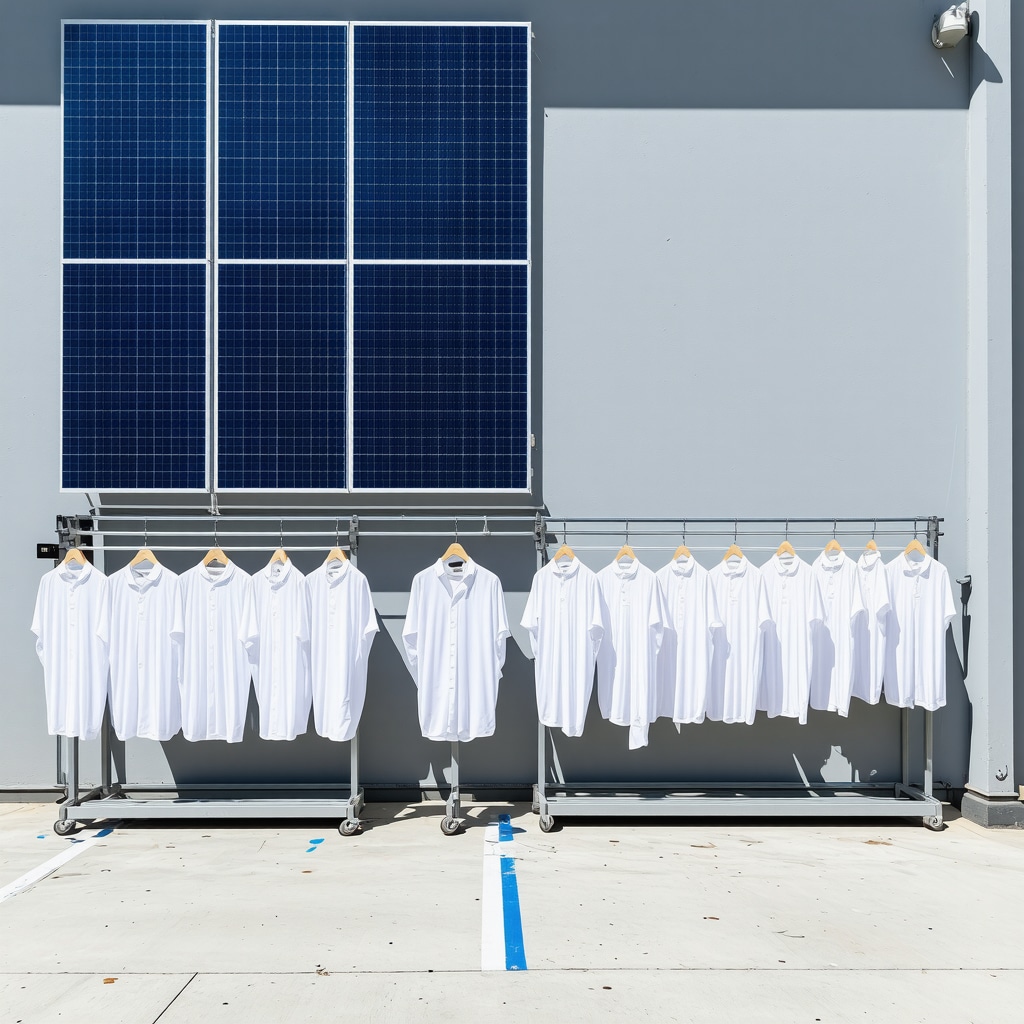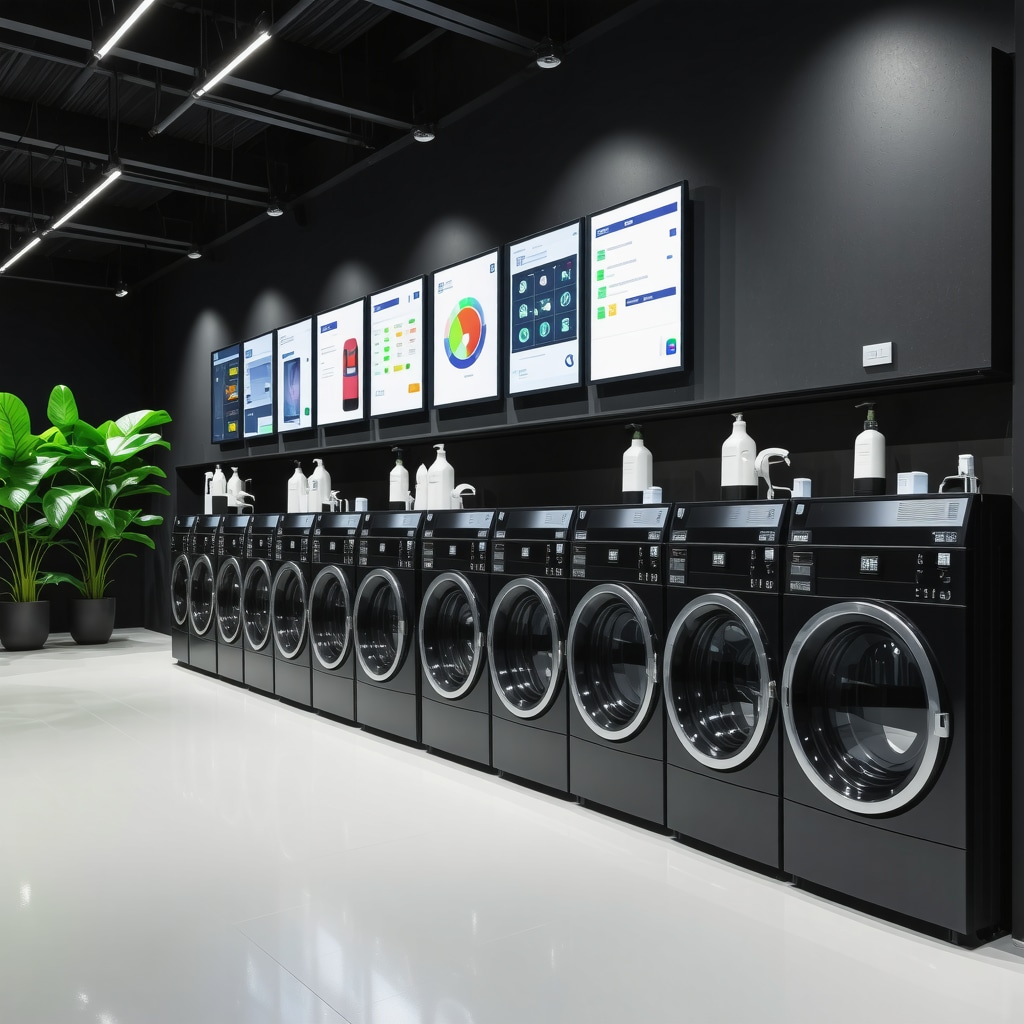Leveraging Expert Insights to Optimize Eco-Friendly Dry Cleaning Home Pickup Services in Tampa
In the rapidly evolving landscape of sustainable fabric care, Tampa’s eco dry cleaning industry exemplifies how integrating environmental principles with logistical efficiency can redefine customer service. As professionals in the field, we recognize that a nuanced approach to eco dry cleaning home pickup not only enhances operational effectiveness but also promotes ecological stewardship, aligning with broader environmental goals such as reducing carbon emissions and eliminating toxic solvents.
Innovative Eco-Friendly Technologies in Tampa’s Dry Cleaning Ecosystem
Recent advancements, such as plant-based cleaning solvents, demonstrate a significant shift towards non-toxic, biodegradable solutions that minimize environmental impact. These innovations are crucial for Tampa’s eco-conscious clientele seeking safe, sustainable garment care options. Incorporating such technologies into home pickup services entails strategic planning, including staff training and logistics management, to ensure seamless adoption and customer satisfaction.
Complexities of Implementing Sustainable Logistics in Tampa
Optimizing pickup routes via advanced GIS mapping and real-time logistics software not only reduces fuel consumption but also aligns with Tampa’s commitment to green logistics practices. This technical integration is pivotal in achieving a low-emission, efficient service that appeals to eco-minded consumers while maintaining profitability. Challenges include balancing route optimization with timely pickups and ensuring vehicle maintenance for minimal environmental footprint.
What are the Key Factors to Guarantee Eco Certification for Pickup Services?
How can Tampa’s dry cleaners ensure compliance with evolving eco standards and gain trust as certified green providers?
Achieving eco certification involves rigorous adherence to environmentally friendly practices, transparent reporting, and consistent service quality. For instance, engaging with certification bodies that verify sustainable operations can enhance credibility. Incorporating customer feedback and maintaining transparent communication about eco practices reinforce trust and market positioning.
Encouraging Industry-Wide Adoption of Sustainable Practices in Tampa
To foster a broader shift towards environmentally responsible dry cleaning, industry stakeholders should collaborate on shared standards, innovation grants, and consumer education campaigns. This collective effort not only elevates Tampa’s reputation as an eco-friendly hub but also accelerates the transition to sustainable fabric care methods, such as zero-waste processes.
For professionals seeking to deepen their expertise, exploring perc-free dry cleaning options offers valuable insights into chemical-free alternatives that align with Tampa’s sustainability ambitions. Your contributions and insights can significantly influence the future of eco dry cleaning in the region, fostering a cleaner, greener Tampa.
Harnessing Cutting-Edge Certification Frameworks to Elevate Tampa’s Eco Dry Cleaning Standards
In the quest to establish Tampa as a leader in sustainable fabric care, understanding and implementing advanced eco-certification standards is paramount. Certifications such as green certification go beyond basic compliance, demanding rigorous audits and continuous improvement. As industry experts, we recognize that adopting a comprehensive framework—including lifecycle assessments and transparent reporting—can significantly bolster credibility and customer trust.
Integrating Lifecycle Analysis for Authentic Sustainability Claims
One sophisticated approach involves life cycle analysis (LCA), which evaluates the environmental impact of each stage of your service—from sourcing eco-friendly solvents to end-of-life garment disposal. Incorporating LCA not only satisfies certification criteria but also provides actionable insights to optimize operations further. For example, selecting biodegradable solvents such as plant-based cleaning agents can dramatically reduce your carbon footprint and appeal to eco-conscious consumers.
What innovative tools can help eco dry cleaners quantify and communicate their sustainability achievements effectively?
Digital platforms like sustainability reporting software are emerging as vital tools for tracking and sharing your environmental impact transparently. These tools enable real-time data collection, facilitate third-party audits, and generate reports aligned with standards such as Perc-free and chemical-free certifications. By leveraging such technology, Tampa’s dry cleaners can demonstrate genuine commitment, differentiate their brand, and foster long-term customer loyalty.
Fostering a Culture of Continuous Improvement and Industry Collaboration
Achieving and maintaining eco certification is not a one-time effort but an ongoing process. Industry stakeholders should establish collaborative platforms for knowledge sharing, innovation grants, and joint training programs. Initiatives like zero-waste fabric care solutions exemplify how collective efforts can accelerate sustainable innovation. Moreover, engaging customers through educational campaigns about eco-friendly practices can reinforce your commitment and inspire broader industry adoption.
For those seeking to deepen their expertise, exploring perc-free dry cleaning alternatives presents a pivotal step toward safer, greener operations. Upholding high standards of transparency and accountability not only enhances your certification prospects but also solidifies your reputation as a responsible business in Tampa’s eco-conscious community.
Share your experiences or ask questions in the comments below—your insights can inspire others and foster a thriving green dry cleaning network in Tampa!
Implementing Lifecycle Assessment (LCA) for Credible Eco Certification in Tampa
Lifecycle assessment (LCA) is an invaluable analytical tool that evaluates the environmental impacts associated with every stage of a service or product, from raw material extraction to disposal. For Tampa’s dry cleaners aiming for top-tier eco certification, integrating LCA into operational workflows provides quantifiable data that substantiate sustainability claims and reveal areas for improvement. By adopting comprehensive LCA frameworks, businesses can identify hotspots—such as energy-intensive processes or wasteful packaging—that, when optimized, significantly reduce overall carbon footprints.
Recent advances in LCA software, such as GaBi or SimaPro, have democratized access to sophisticated modeling, enabling even small enterprises to leverage detailed impact analyses. For instance, by analyzing the life cycle of plant-based solvents used in cleaning, Tampa’s dry cleaners can demonstrate reduced toxicity and lower emissions, reinforcing their eco credentials to certifying bodies like Green Seal or EcoLabel. Moreover, transparent reporting based on LCA results enhances consumer trust and distinguishes your brand in a competitive market.
Nuanced Approaches to Achieving and Maintaining Green Certifications
Securing green certification is not merely about meeting baseline standards but also about continuous improvement and adaptive management. Certifications such as LEED for facilities or ISO 14001 for environmental management systems demand rigorous documentation, frequent audits, and a proactive stance on environmental innovation. Tampa’s dry cleaners can benefit from establishing internal sustainability committees tasked with ongoing evaluation of practices, staff training, and stakeholder engagement.
For example, implementing an internal audit protocol aligned with ISO 14001 principles ensures compliance and highlights opportunities for process enhancements. Additionally, engaging third-party auditors with specific expertise in dry cleaning operations can uncover hidden inefficiencies or compliance gaps. These steps foster a culture of excellence and resilience, positioning Tampa’s dry cleaning industry as a leader in green innovation.

Visualize an eco-friendly dry cleaning facility with solar panels, biodegradable packaging, and efficient transport vehicles to exemplify sustainable operations.
Leveraging Digital Tools for Sustainability Transparency and Stakeholder Engagement
Modern digital platforms are revolutionizing how businesses communicate their environmental impact. Sustainability reporting software, like Gensuite or Enablon, enables real-time tracking of key performance indicators, such as energy consumption, emissions, and waste diversion rates. These platforms facilitate third-party audits, generate comprehensive sustainability reports, and help maintain certification compliance.
In Tampa, adopting such tools not only streamlines certification processes but also enhances transparency with consumers and regulatory bodies. Detailed dashboards and impact summaries can be integrated into marketing strategies, demonstrating your company’s commitment to sustainability. Furthermore, engaging customers through interactive online content about eco-friendly practices fosters loyalty and positions your brand as a responsible industry innovator.
Creating a Collaborative Ecosystem for Sustainable Innovation in Tampa
Achieving and maintaining high standards in eco dry cleaning requires a collective effort. Industry stakeholders can establish collaborative platforms—such as local sustainability alliances or innovation hubs—that facilitate knowledge sharing, joint research projects, and resource pooling. Initiatives like shared grants for green technology adoption or industry-wide training programs accelerate progress and promote best practices.
For example, forming partnerships with local environmental organizations or universities can lead to pilot projects exploring zero-waste operations or biodegradable solvent alternatives. These collaborations not only foster innovation but also reinforce Tampa’s reputation as a pioneering city in sustainable fabric care. As industry leaders, your active participation and leadership in these initiatives can inspire broader regional adoption and set new standards for eco excellence.
If you are interested in exploring advanced certification strategies or implementing cutting-edge sustainability tools, consider consulting with specialized environmental consultants or industry associations dedicated to green dry cleaning. Your proactive engagement today will shape Tampa’s future as a model city for eco-conscious fabric care.
Advanced Certification Frameworks: Setting Tampa’s Eco Dry Cleaning Industry Apart
Achieving elite eco certification requires more than basic compliance; it demands an integrated approach that encompasses comprehensive environmental management, innovative impact assessments, and stakeholder collaboration. Tampa’s dry cleaners aspiring to lead in sustainable fabric care must adopt frameworks such as ISO 14001, which mandates systematic environmental management, or Green Seal standards, renowned for rigorous criteria on chemical usage and waste reduction. Implementing these standards not only elevates credibility but also fosters a culture of continuous improvement, positioning businesses as pioneers in eco excellence.
Innovative Impact Quantification through Life Cycle Assessment (LCA)
One of the most sophisticated tools at an eco dry cleaner’s disposal is Life Cycle Assessment (LCA). This quantitative methodology evaluates environmental impacts from resource extraction to disposal, enabling precise identification of hotspots and opportunities for mitigation. For example, analyzing the entire supply chain of biodegradable solvents reveals potential emission reductions, providing compelling data to support eco claims and certification pursuits. Industry reports from institutions like the European Commission’s Joint Research Centre underscore the importance of LCA in authentic sustainability reporting, serving as a cornerstone for reputable certification.
How can Tampa’s dry cleaners leverage digital tools to substantiate their environmental claims?
Digital impact tracking platforms such as Enablon or Gensuite enable real-time monitoring of energy consumption, emissions, and waste metrics, ensuring ongoing compliance with rigorous standards. These platforms facilitate transparent reporting, simplify third-party audits, and generate data-driven insights to optimize operations. By integrating these tools into daily workflows, Tampa’s eco dry cleaners can substantiate their sustainability claims with verifiable data, thereby strengthening their market reputation and customer trust.

Depict a modern dry cleaning facility utilizing advanced digital dashboards for environmental impact monitoring, with eco-friendly branding elements.
Building a Resilient Ecosystem for Continuous Green Innovation
To maintain a competitive edge, Tampa’s dry cleaning industry must foster a resilient ecosystem that encourages innovation, knowledge sharing, and adaptive management. Establishing regional alliances with environmental organizations, academic institutions, and industry associations facilitates joint research on zero-waste processes, biodegradable solvents, and energy-efficient technologies. These collaborations not only accelerate the adoption of cutting-edge sustainable practices but also create a collective voice advocating for policy incentives and industry standards that support green growth.
Engaging in industry-wide certification consortia can streamline the accreditation process, share best practices, and set regional benchmarks. For example, a Tampa-based Green Dry Cleaners Consortium can serve as a model for sustainability leadership, inspiring others and amplifying regional reputation as an eco-conscious hub. Such initiatives demonstrate that collective efforts transcend individual business gains, fostering a sustainable future for fabric care in Tampa.
Harnessing the Power of Data-Driven Storytelling to Elevate Consumer Trust
Effective communication of sustainability achievements is crucial in differentiating your brand. Leveraging detailed impact reports generated through impact assessment tools allows businesses to craft compelling narratives about their eco journey. Incorporating visual data, customer testimonials, and transparent progress updates into your marketing channels builds credibility and fosters deeper engagement. As consumers increasingly prioritize sustainability, your ability to transparently showcase verified impacts can translate into enhanced loyalty and a competitive advantage.
Consider developing an interactive online platform where customers can explore your environmental metrics, learn about eco-friendly practices, and see real-time updates on your sustainability goals. This level of transparency not only aligns with consumer expectations but also positions Tampa’s dry cleaning industry as a leader in authentic eco stewardship.
Expert Insights & Advanced Considerations
1. Emphasize the importance of lifecycle assessments (LCA) in validating eco claims, enabling dry cleaners to quantify environmental impacts accurately and identify hotspots for improvement.
Implementing comprehensive LCA frameworks, using tools like GaBi or SimaPro, allows Tampa’s dry cleaners to substantiate sustainability claims with data-driven insights, fostering transparency and credibility in eco certification pursuits.
2. Prioritize continuous improvement through internal audits and stakeholder engagement, ensuring that green practices evolve with technological advances and regulatory standards, thus maintaining competitive advantage and certification validity.
Adopting standards like ISO 14001 and engaging third-party auditors can uncover inefficiencies and foster a resilient culture of environmental excellence, positioning Tampa as a leader in sustainable fabric care.
3. Leverage digital impact reporting platforms to track, analyze, and communicate environmental performance in real-time, enhancing stakeholder trust and facilitating compliance with evolving eco standards.
Platforms like Enablon and Gensuite streamline data collection, generate transparent reports, and support third-party verification, reinforcing your commitment to sustainability and differentiating your brand in a competitive market.
Curated Expert Resources
- European Commission’s Joint Research Centre Impact Assessment Reports: Provides comprehensive methodologies for conducting LCAs, essential for credible eco certification.
- ISO 14001 Environmental Management System Standard: Offers a robust framework for continuous environmental performance improvement and compliance.
- SimaPro and GaBi Software: Industry-leading tools for detailed impact modeling, critical for data-driven sustainability practices.
- Enablon and Gensuite Digital Platforms: Facilitate real-time environmental impact tracking and transparent reporting, vital for stakeholder engagement.
- Green Seal Certification Guidelines: Defines strict criteria for sustainable dry cleaning operations, serving as a benchmark for excellence.
Final Expert Perspective
In the realm of eco dry cleaning, integrating advanced impact assessment techniques like Life Cycle Analysis and leveraging innovative digital tools are pivotal for establishing genuine sustainability in Tampa’s industry. These strategies not only substantiate your eco claims but also foster a culture of continuous improvement and stakeholder trust. As an industry leader, embracing these cutting-edge approaches will position your business at the forefront of environmental responsibility and market credibility. We invite you to deepen your expertise by exploring these resources and sharing your insights, thereby contributing to Tampa’s reputation as a regional hub of sustainable fabric care excellence.

